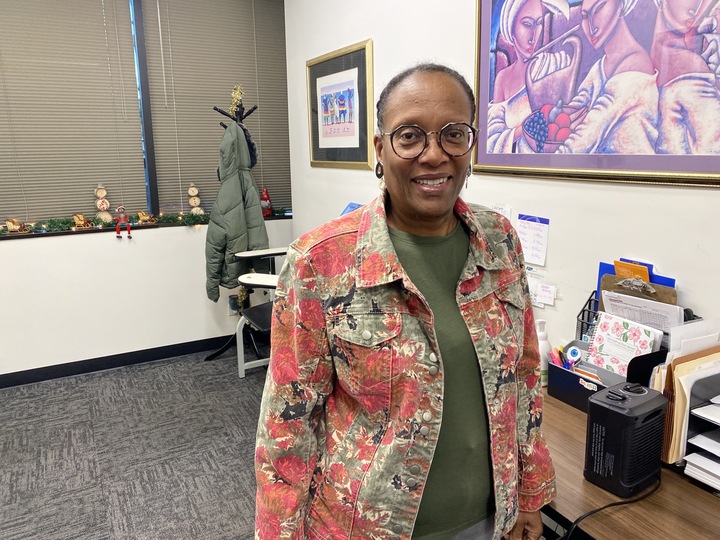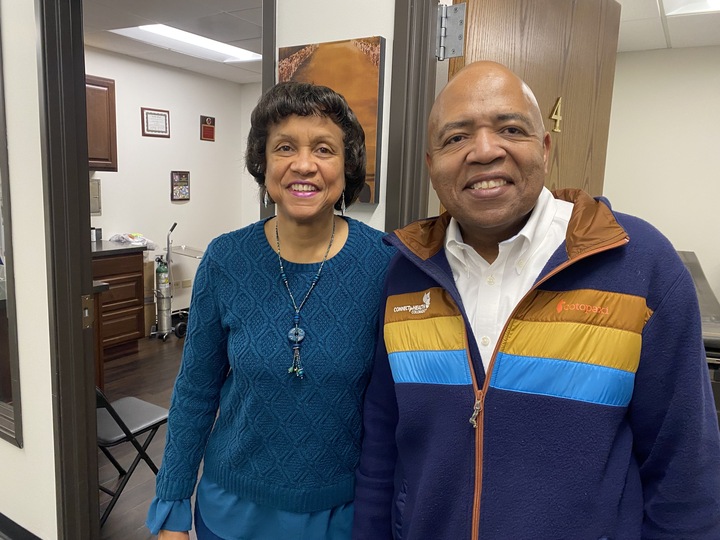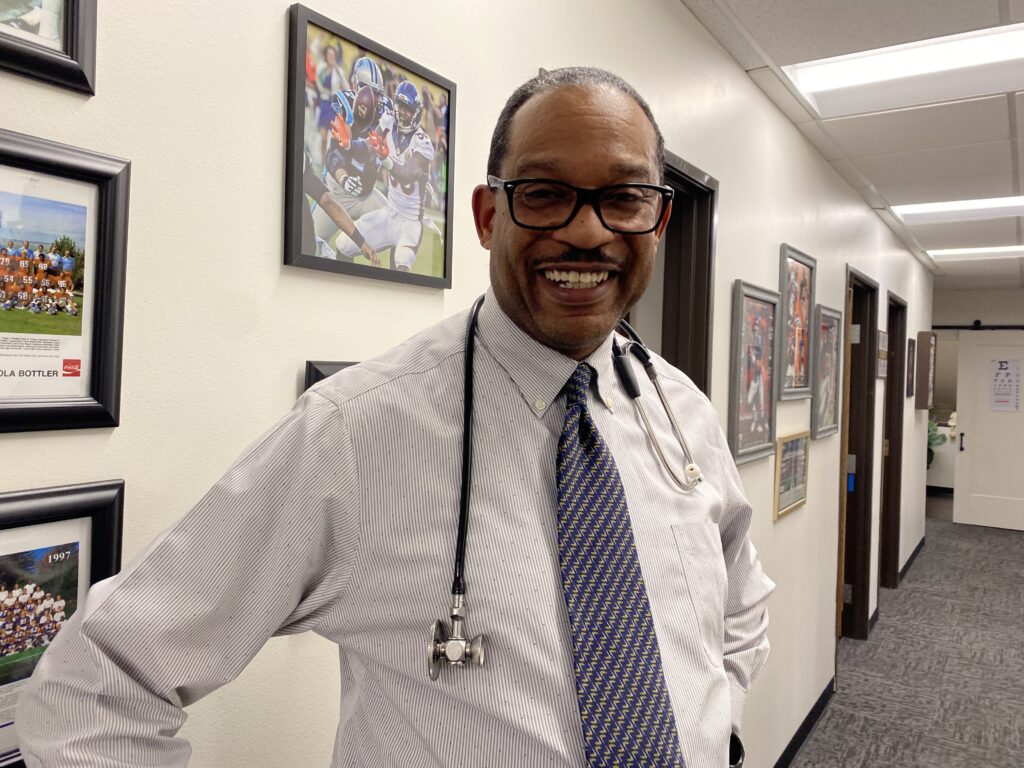Several years ago, Robin Bruce of Aurora, was hit by a truck while she was walking in a crosswalk in Colorado.
“I get to the hospital. And I’m a nurse, I had been trained in emergency medicine. I was a combat flight nurse,” she said. “So I already knew I had symptoms that I shouldn’t have had.”
She noticed her blood pressure was unusually high, and she was getting lightheaded. She said staff told her, ‘No, we’ve seen higher, you’ll be OK.’
Bruce said, “‘I feel woozy,’ and I list the symptoms that I was having. They just kind of dismissed me.”
She asked to be discharged and went home. The room began to spin. She went to another facility, a teaching hospital. There staff admitted her with a torn artery in the back of her neck, a serious and potentially life-threatening situation.

John Daley/CPR News
She’s Black and is convinced some providers treating her didn’t listen and were making assumptions about her condition because of her race. “The health care providers in that emergency room basically dismissed what I was saying,” Bruce said.
Complaints like this, about the health system writ large, are not uncommon for Black patients. A new, free, statewide Black Health directory aims to make some progress.
First publishing since the pandemic
“We want to try to give people what they asked for if they want a Black doctor or someone who has lived experience. That’s really what it’s about,” said Dr. Terri Richardson, a retired Denver doctor who helped put the directory together. It was first published in 2010, with updated editions until 2019. Three-thousand five hundred copies have been printed.
This is the first directory published since the pandemic, and Richardson said it’s back by popular demand. Patients want “someone who knows about our experience here in America. They may have had some of the same experiences that I’ve had. And so that person is more trusted.”
The Colorado Black Health Resource Directory is published by the Colorado Black Health Collaborative, in partnership with Connect for Health Colorado, the state’s health insurance exchange.
“I think it’s really important, especially as we’re looking at communities of color that want to find a provider that looks like them, understands their needs,” said Kevin Patterson, the exchange’s CEO.

John Daley/CPR News
Unique challenges, disparities
He noted the directory is an invaluable source regarding all kinds of care, in which Black patients may face unique challenges.
Take, for example, black maternal mortality, death during pregnancy or within a year of the end of pregnancy. Black women in the U.S. face a higher risk of maternal mortality than white women.
The same is true in Colorado. A report from Colorado’s Maternal Mortality Review Committee, looking at data from 2016-2020, showed Black pregnant and postpartum patients had a 104.5 mortality rate (per 100,000). That’s much higher than the overall mortality rate for the state’s pregnant and postpartum population, which was 54.7.
“So how do we make sure that someone understands what we’re up against, what our morbidities are all about. All those things that are really important to us that we think about all the time that other people are still having to study,” Patterson said.
A Black doctor may well have more insights on a range of conditions faced by a Black patient.
“It’s just different. And I think it allows the doctor and patient to connect in a very, very real and different way,” he said.
Doctors, dentists, midwives and more
The 100-plus page directory lists specialists, like nutritionists, midwives and optometrists, from Fort Collins to Pueblo, with more than 100 doctors. It also includes health-related articles from medical professionals and government, political, religious, and community leaders.
Dr. Alfred Nash is a family medicine physician in Aurora. He’s listed in the directory and said he thinks it makes a difference for the health of patients.
“If they don’t feel comfortable in the place that they’re receiving their care from, the chances of them following up when they’re supposed to follow up to continue their therapy that they’re supposed to continue is a lot less,” he said.

John Daley/CPR News
One broader challenge is that there’s been slow progress in diversifying the medical workforce. Nash said that’s true both nationally and in Colorado.
“It’s funny, but the availability or the presence of people in medicine of color is not really accessible a lot of times,” Nash said. “This directory helps to kind of bridge that gap.”
Beyond access, there’s comfort levels
Black Coloradans face many health disparities, which often lead to worse outcomes, from life expectancy to health coverage to mental health to chronic health conditions.
Richardson said those gaps are perpetuated not just by a lack of access to care but how uncomfortable some people feel in the health system.
“I’ve heard this from direct experience, how some man said ‘I’d rather maybe have a male doctor, but when I had a white male doctor or white female, they didn’t touch me, didn’t look me in the eye, didn’t shake my hand,’” she said. “And this is modern times, we’re not talking about in the 60s.”
According to a recent Colorado Health Institute study, race, ethnic background, and culture were the most common reasons people of color reported being treated with less respect in the health care system.
In 2021, a survey by the institute, found more than 5 percent of Black or African American and more than 4 percent of Hispanic/Latino Coloradans reported “skipping health care due to fear of unfair treatment.” That compared to a little more than 2 percent of white Coloradans.
A step forward
Patient, and nurse, Robin Bruce agreed that while the directory can’t solve larger systemic issues, it’s a great step forward.
“I get calls all the time saying, ‘I’ve had enough. Does anybody know of a black doctor?’ Because the care just is different,” she said. “It’s win-win if you want to serve your community, right?”
And not for just the Black community. Those doctors who are not Black, but who have patients who are, could also benefit.
“If they have a patient and they want to find out more information about how to treat their patient, they could consult with one of the doctors that are in the directory,” she said.
Or she said, if, say, they have a patient who is looking for a Black mental health provider, they’ll know where to turn.
Coloradans can request a printed copy, or find the directory online, on the Colorado Black Health Collaborative’s website.


